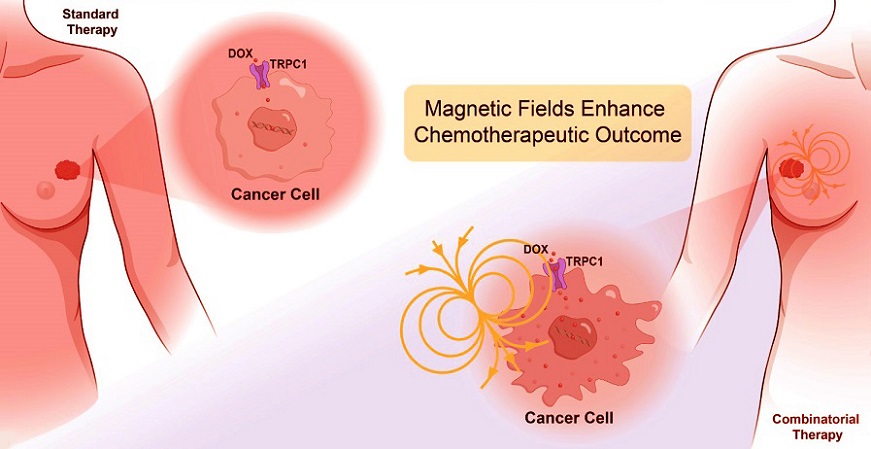Singapore Study Finds That Brief Exposures to Magnetic Fields Can Enhance Uptake of Breast Cancer Chemotherapeutic Drugs
Nikhil Prasad Fact checked by:Thailand Medical News Team Dec 23, 2024 3 months, 4 weeks, 16 hours, 13 minutes ago
Medical News: A new study led by researchers from the National University of Singapore (NUS) has unveiled a groundbreaking method to boost the efficacy of chemotherapy in breast cancer treatment. By using brief exposures to magnetic fields, the team found a way to enhance the uptake of doxorubicin, a commonly used chemotherapeutic drug, into breast cancer cells. This innovative approach promises to reduce harmful side effects associated with traditional chemotherapy, offering hope for a more targeted and efficient cancer treatment.
 Singapore Study Finds That Brief Exposures to Magnetic Fields Can Enhance Uptake of Breast Cancer Chemotherapeutic Drugs
The Role of Doxorubicin in Cancer Therapy
Singapore Study Finds That Brief Exposures to Magnetic Fields Can Enhance Uptake of Breast Cancer Chemotherapeutic Drugs
The Role of Doxorubicin in Cancer Therapy
Doxorubicin (DOX) is a mainstay in cancer treatment, valued for its ability to combat a variety of malignancies, including breast, ovarian, and lung cancers. Its effectiveness lies in its capacity to disrupt DNA replication, halting cancer cell growth and inducing apoptosis. However, its systemic delivery often leads to significant side effects, including heart damage, muscle atrophy, and cognitive impairments. These challenges underscore the urgent need for more precise and localized drug delivery methods.
In this
Medical News report, we explore how magnetic field exposure could revolutionize the way doxorubicin is administered, focusing its impact on cancer cells while sparing healthy tissues. The study sheds light on the potential of magnetic fields in precision oncology.
Magnetic Fields and TRPC1 Expression
The researchers discovered that brief exposure to pulsed electromagnetic fields (PEMFs) enhanced the expression of TRPC1, a specific ion channel found in breast cancer cells. TRPC1 plays a crucial role in regulating calcium ion entry into cells, a process that is often disrupted in cancer. Importantly, higher TRPC1 expression levels correlate with advanced breast cancer grades, making it a potential biomarker for cancer progression.
In laboratory experiments, the team exposed breast cancer cells to a 10-minute PEMF session. The results were striking: cells with higher TRPC1 expression absorbed significantly more doxorubicin compared to untreated cells. This targeted uptake suggests that magnetic fields could serve as a non-invasive tool to amplify the effects of chemotherapy while minimizing its impact on healthy cells.
Detailed Findings from the Study
The study’s findings were meticulously detailed through various experimental setups. Human and murine breast cancer cells were treated with doxorubicin and then exposed to PEMFs. The results demonstrated:
-Enhanced Drug Uptake: A 70% increase in doxorubicin absorption in human breast cancer cells (MCF7) after just 10 minutes of magnetic exposure.
-Improved Cancer Cell Death: Magnetic field exposure significantly lowered the drug’s IC50 value (the concentration required to
kill half the cancer cells), making the treatment more effective.
-Selective Targeting: Healthy muscle cells were largely unaffected by the magnetic field, underscoring the specificity of this approach.
To validate these findings, the team manipulated TRPC1 levels using genetic and pharmacological techniques. When TRPC1 was inhibited, the magnetic field’s effects on drug uptake were markedly reduced. Conversely, cells engineered to overexpress TRPC1 showed even greater sensitivity to magnetic stimulation.
Innovative Use of Cell-Derived Vesicles
In a further extension of the study, the researchers developed cell-derived vesicles (CDVs) enriched with TRPC1. These vesicles, when exposed to magnetic fields, were loaded with doxorubicin and subsequently delivered to cancer cells. This approach effectively combined the precision of magnetic targeting with the versatility of vesicular drug delivery, paving the way for advanced therapeutic strategies.
Broader Implications for Cancer Treatment
The implications of this study extend beyond breast cancer. The principles underlying PEMF-induced drug uptake could potentially be applied to other cancers characterized by high TRPC1 expression. Moreover, the non-invasive nature of magnetic fields makes this technology highly adaptable to clinical settings, offering a safer alternative to conventional chemotherapy.
Conclusions
This innovative research highlights the potential of magnetic fields as a game-changing tool in cancer treatment. By enhancing the targeted delivery of doxorubicin, PEMFs could significantly reduce the systemic toxicity of chemotherapy. The findings also position TRPC1 as both a biomarker and a therapeutic target, opening new avenues for personalized cancer care.
The study’s conclusions underscore the need for further exploration into the clinical applications of magnetic field therapy. Researchers envision a future where cancer treatments are not only more effective but also less burdensome for patients.
The study findings were published in the peer-reviewed journal: Cancers.
https://www.mdpi.com/2072-6694/16/22/3860
For the latest Cancer News, keep on logging to Thailand
Medical News.
Read Also:
https://www.thailandmedical.news/news/turkish-study-explores-possible-link-between-microbiota-and-breast-cancer
https://www.thailandmedical.news/news/breast-cancer-research-highlights-the-biphasic-effects-of-red-clover-extracts
https://www.thailandmedical.news/articles/cancer
